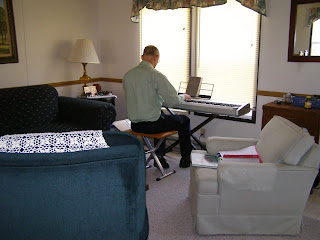I wanted to get in one last blog post for this year, so here it is. This one concerns my studies.
I'm working toward a deadline next May. At that point I have to submit my doctoral proposal to the University of Wales for approval. Before that, however, my proposal has to be approved by the Oxford Centre for Mission Studies (OCMS). Sound confusing? The UK system is different from the US, and it may be that OCMS is unique in the UK. Here is how I understand the process.
I am not yet admitted to a doctoral program. As I understand it, everyone in the UK has to go through probationary stages in order to get into a doctoral program. My program may be more complicated than most. First, in the UK, there are educational institutions which are not authorized to grant degrees but which are affiliated and accredited by universities which do grant degrees. That is the case for OCMS. While it is a top-notch Christian educational institution, it is not authorized to grant degrees. It isn't even affiliated with Oxford University, although we are allowed to use the Oxford University library. Instead, it is accredited with the University of Wales, and it is that university which grants the final degree.
Now, while I am enrolled in the program at OCMS, I am not yet registered at the University of Wales. To do that I have to submit a 2,500-word research proposal (that's not a lot of words, by the way) accompanied by a 5,000-word essay and an extensive bibliography (That's not long, either when you consider that the final dissertation will be 80,000-100,000 words long). The deadline for submission is in May. Before that, however, OCMS has to also approve the proposal. The OCMS committee will meet in March to approve dissertation proposals. So, I have to have all my work done by the end of February. My OCMS advisor, however, wants to see a workable proposal by the end of January. Yikes, that's one month away.
I have completed a first draft of both the proposal and the essay and sent them to my adviser. While the research proposal seems to be mostly okay, I have some extensive revisions to make on the essay. If you want to know more about the proposal or essay, write me. I'm not going to reveal the title on the Internet because I want to be careful what I say and where, but if you want to know more, let me know.
Once OCMS approves the proposal in March it will be sent to the University for approval in May. From that point I will be registered at the University of Wales, but I will only be at a master's level. It's kind of probationary period to see if you can cut it at the doctoral level. After two years of research and writing, I will be reevaluated, and then I will apply for an upgrade to a doctoral level. Up until then I can make adjustments to my proposal and my research. After I get upgraded to the doctoral level, the real fun begins as I work on my dissertation in earnest. I expect it will take about three years to finish my studies after the upgrade to the doctoral level. Remember I'm only working on it 'half-time'. That will make it around 2016 before I finish! 'And miles to go before I sleep....'
L'Abeille Boutique
7 years ago















































